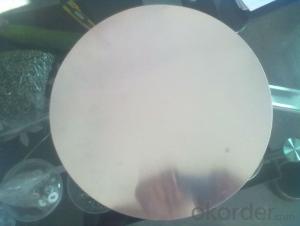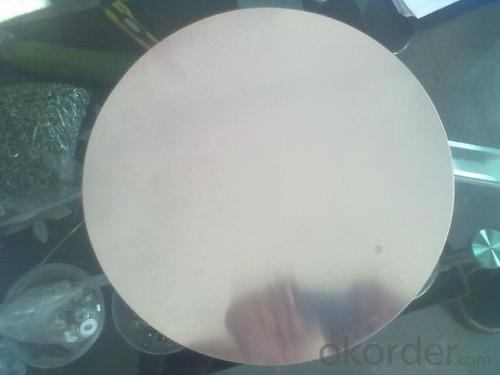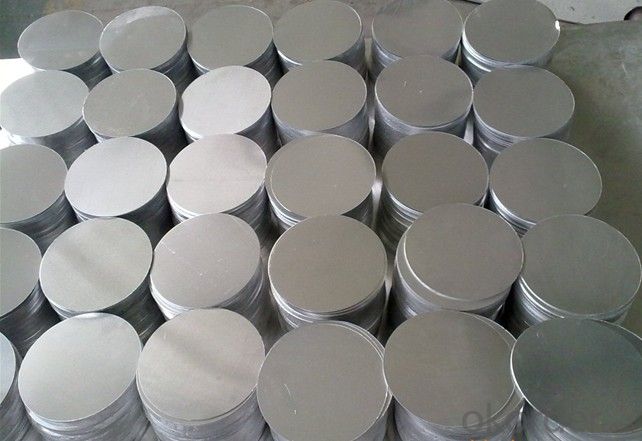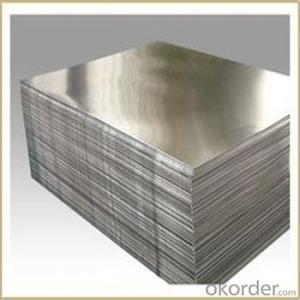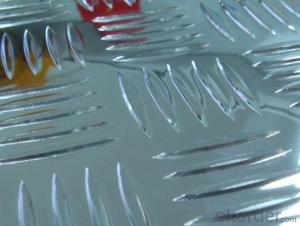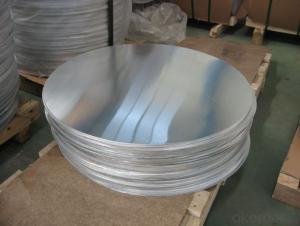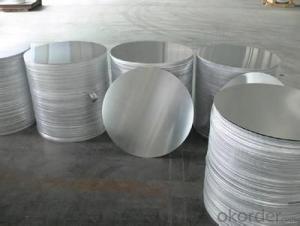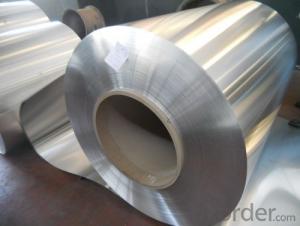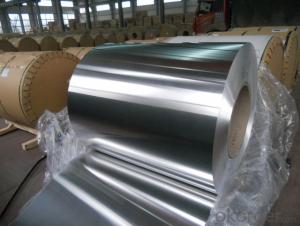0.05-4.0mm Thickness 3003 Bending Aluminum Sheets for Household
- Loading Port:
- Shanghai
- Payment Terms:
- TT OR LC
- Min Order Qty:
- 1 m.t.
- Supply Capability:
- 6000 m.t./month
OKorder Service Pledge
OKorder Financial Service
You Might Also Like
Specification
0.05-4.0mm Thickness 3003 Aluminum Circle For Household
Packaging & Delivery
| Packaging Details: | 25kg/carton-boxes(35*32*19CM) &Fumigation wooden-pallets (110*110*15cm) 20GP can loading 22 Ton,total 21 pallets,20 CBM. |
| Delivery Detail: | within 25 days |
Specifications
1).Excellent Surface Quality for lighting reflectors.
2).Excellent deep drawing and spinning quality.
3).Anodizing Quality
Aluminium circle/Aluminium discs/disks for cooking utensils Cookware
Aluminum disc Surface Finish: Bright & smooth surface, without flow lines, slightly oiled to avoid White rusting.Smooth,Brightly ,No Zone of Fracture ,No Scratched ,No oil Sludge
We enjoy a good reputation among our customers for our aluminum circle with high quality and competitive price, win high appreciation from our clients with the excellent workman-ship and professional ability. The quality matches with ISO 9001 quality management system.
It is equipped with 5 hot tandem rolling line, 4 cold mill production lines, 4 annealing surface machines and a complete finishing equipment.
Specification:
Alloy
Temper
Specification
Thickness
Diameter
1070,1050,3003,1100
O,H12,H14,H16
0.5-5.0mm
100-1200mm
Aluminum disc chemical Properties(WT.%)
Alloy
Si
Fe
Cu
Mn
Mg
Cr
Ni
Zn
Ca
V
Ti
Other
Min.A1
1050
0.25
0.4
0.05
0.05
0.05
-
-
0.05
-
0.05
0.03
0.03
99.5
1070
0.25
0.25
0.04
0.03
0.03
-
-
0.04
-
0.05
0.03
0.03
99.7
3003
0.6
0.7
0.05-0.2
1.0-1.5
-
-
-
0.1
-
-
-
0.15
96.95-96.75
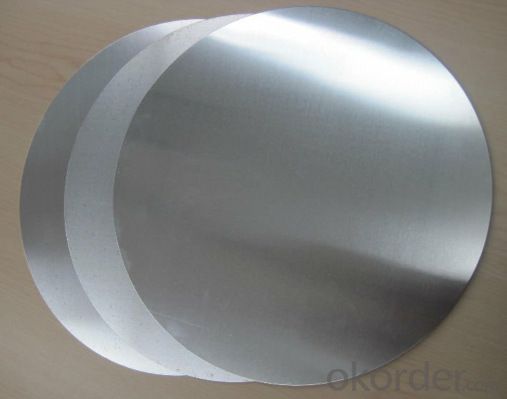
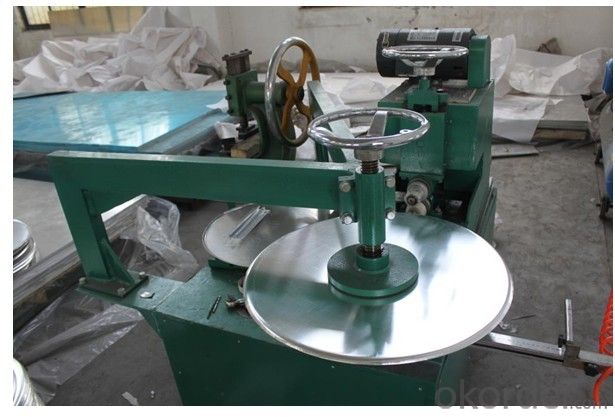
- Q: What are the limitations of using aluminum sheet?
- Using aluminum sheet in various applications comes with several limitations. Firstly, compared to steel or titanium, aluminum is a relatively soft metal. This means it is more prone to scratches, dents, and deformation when subjected to heavy loads or impacts. As a result, it may not be suitable for applications that require high strength or resistance to damage. Secondly, aluminum has lower thermal conductivity than other metals. This can be a disadvantage in applications that require efficient heat transfer, such as heat exchangers or cooling systems. Thirdly, aluminum is susceptible to corrosion. Although it has a natural oxide layer that provides some protection, it can still corrode in certain environments, especially in the presence of moisture or acidic substances. This limits its use in applications where corrosion resistance is crucial, such as in the marine or chemical industries. Additionally, compared to other options, aluminum is a relatively expensive material. Its production and extraction processes require significant energy and resources, which contribute to higher costs. Therefore, it may not be the most cost-effective choice for some applications. Lastly, aluminum has limited compatibility with certain substances. It can react with certain chemicals, leading to degradation or contamination. Therefore, it may not be suitable for applications where it will come into contact with substances that can cause adverse reactions. In conclusion, although aluminum sheet has numerous advantages such as its lightweight nature, good electrical conductivity, and ease of fabrication, it is important to consider its limitations when choosing it for specific applications.
- Q: Do 101 aluminum sheets have any specific certifications or standards?
- Yes, 101 aluminum sheets typically have certifications and standards that ensure their quality and performance. These may include certifications like ASTM (American Society for Testing and Materials) and standards such as AA (Aluminum Association) standards, which verify the material's composition, mechanical properties, and manufacturing processes. Additionally, specific industry certifications like ISO 9001 (International Organization for Standardization) may be applicable to ensure consistent quality control during production.
- Q: The only materials i can use is iodine, water, HCl, magnet, and pH paper. How do you identify aluminum with that?
- To start with, are you refering to aluminum as metal, an aluminum compound, or a solution with aluminum present as ions? If it is metaallic aluminum, it won't stick to a magnet, and it will react with HCl, however this isn't sufficient to definately say it is aluminum, it would be better to get a density, melting point, etc.
- Q: Can aluminum sheets be easily bent or shaped?
- Due to its malleability, aluminum sheets are easily bendable and shapeable. This soft and lightweight metal possesses remarkable formability characteristics, making it highly suitable for various shaping processes. Numerous techniques, including press braking, roll forming, and stretch forming, can be used to easily bend, fold, or form aluminum into different shapes. Its malleability allows for the creation of intricate shapes without any cracking or breaking. Moreover, the low melting point of aluminum enables further shaping through processes like hot bending or thermoforming. As a result, aluminum sheets offer exceptional flexibility and ease of shaping, making them a favored choice in industries such as automotive, aerospace, construction, and manufacturing.
- Q: How do aluminum sheets compare to steel sheets in terms of weight?
- Aluminum sheets are significantly lighter than steel sheets, as aluminum has a lower density compared to steel.
- Q: Hello, I dont really know anything about using a drill or cutting through metal or wood. the thing is I have a project in which I have to drill some holes in 0.04in aluminum. but I really dont know if can use regular drill bits used for drilling wood to drill the holes in my aluminum chassis. do I need to buy other drill bits for cutting metal or can I use the same ones Ive seen used for cutting wood? can I even use the same kind of drills, or do I NEED a huge bench drill with stepper bits?thanks
- Aluminum is softer than steel, so you could just use the ordinary bits that you use for wood, with a hand drill. For cleaner holes, you might want to put wood behind the aluminum as a backing. Also, if you squirt a drop of oil onto the drill area, that will help. If you're trying to drill a really large hole, it might be better to drill small ones, and enlarge with a round file.
- Q: Are aluminum sheets suitable for automotive body framing?
- Yes, aluminum sheets are suitable for automotive body framing. Aluminum is lightweight, corrosion-resistant, and offers excellent strength-to-weight ratio, making it an ideal choice for reducing vehicle weight and improving fuel efficiency. It is commonly used in modern automotive manufacturing for body panels and frames, providing structural integrity while maintaining durability.
- Q: This question asks for a list of various types of aluminum profiles that are typically used in conjunction with aluminum sheets.
- <p>Aluminum profiles are extruded shapes commonly used with aluminum sheets for various applications. The different types include: 1. Angle profiles, which are used for corners and edges. 2. Channel profiles, suitable for creating channels or frames. 3. T-slot profiles, ideal for modular systems requiring adjustable components. 4. U-channel profiles, used for covering edges and creating frames. 5. H-profiles, often used in structural applications. 6. Flat bar profiles, used for simple straight edges. 7. Round and square tube profiles, used for structural support and design elements. 8. Special profiles, which are custom-made for specific applications. These profiles are chosen based on the structural needs and design requirements of the project.</p>
- Q: Are aluminum sheets suitable for electronic components?
- Yes, aluminum sheets are suitable for electronic components. Aluminum is a lightweight and durable metal that has excellent electrical conductivity. It is commonly used in the construction of electronic housings, heat sinks, and circuit boards. Aluminum sheets can be easily machined, formed, and welded, making them versatile for various electronic applications. Additionally, aluminum has good thermal conductivity, allowing it to dissipate heat effectively, which is crucial for preventing overheating in electronic devices.
- Q: This question asks about the various surface treatments or finishes that can be applied to custom-made aluminum sheets.
- <p>Custom-made aluminum sheets can be finished in a variety of ways to achieve different aesthetic and functional properties. Some of the common finishes include: Anodizing, which provides a protective oxide layer and can be colored; Powder coating, offering a durable and colorful finish; Mill finish, which is the natural surface of the aluminum after rolling; Brushed or Satin finish, giving a鍝戝厜 texture; Mirror finish, providing a reflective, polished surface; and Painted finish, where the aluminum is coated with a layer of paint for color and protection. Each finish serves different purposes, from enhancing corrosion resistance to improving the visual appeal of the aluminum sheet.</p>
Send your message to us
0.05-4.0mm Thickness 3003 Bending Aluminum Sheets for Household
- Loading Port:
- Shanghai
- Payment Terms:
- TT OR LC
- Min Order Qty:
- 1 m.t.
- Supply Capability:
- 6000 m.t./month
OKorder Service Pledge
OKorder Financial Service
Similar products
Hot products
Hot Searches
Related keywords
